NANCY MECKLER:I think Helena is often played very whiney and victim-y. It would just be nice to just look at that extreme, just to see what that does to the scene.
LUCY BRIGGS-OWEN:I am your spaniel, and, Demetrius, the more you beat me, I will fawn on you. Use me, but as your spaniel. Spurn me, strike me, neglect me, lose me - only give me leave, unworthy as I am, to follow you.
LUCY BRIGGS-OWEN:I think her behaviour is quite "weak victim", I mean, by virtue of the fact that she's chasing him around the forest
LUCY BRIGGS-OWEN:and stalking him, but her words are a lot stronger than that and she's using some clever arguments and she's playing on words, which is quite a flirty thing to do, I think it's quite a charming thing to do.
LUCY BRIGGS-OWEN:I think to be that subservient and that whingey undermines her. She's fighting against being a complete sobbing victim, a complete wreck.
LUCY BRIGGS-OWEN:So, I think it's really good to play that, so that you know that that's there and that's simmering away, but I think the text is more sophisticated than that, and I think there's more to be found than just that thing.
ALEX HASSELL:If Helena is just a victim, that's unattractive for Demetrius.
ALEX HASSELL:I don't think it really would mean that he would give up his pursuit of Hermia just because he feels bad. Guilt doesn't seem to be a huge part of his make-up.
NANCY MECKLER:Is there an element that we could look at that maybe we haven't so far, in terms of their characters?
ALEX HASSELL:We could try and be more reasonable with each other. That we did have a relationship, we did get on
ALEX HASSELL:and try and find that ground to communicate with one other.
LUCY BRIGGS-OWEN:Slightly more adult, everything under the surface.
NANCY MECKLER:It's more verbal in a way then, isn't it? Because it's really more about what you areÔÇô
LUCY BRIGGS-OWEN:Arguing. Reasoning.
LUCY BRIGGS-OWEN:Use me, but as your spaniel. Spurn me, strike me, neglect me, lose me - only give me leave, unworthy as I am, to follow you. What worser place can I beg in your love - and yet a place of high respect with me than to be used as you do use your dog?
ALEX HASSELL:You do impeach your modesty too much to leave the city and commit yourself into the hands of one that loves you not.
NANCY MECKLER:What's really so useful about that is really hearing-- Getting a chance to really do the arguments. So, in a funny way, you're almost taking the physicality out of it.
NANCY MECKLER:Saying this is much more about my mind trying to affect your mind and I think what we know is that, particularly because they are teenagers, you can't take the body out of it. You don't want to take out the excitement of the physical presence.
LUCY BRIGGS-OWEN:Yeah, I think it makes it more adult and I think if they were capable of having this kind of conversation they probably wouldn't be in this situation.
NANCY MECKLER:Mm.
ALEX HASSELL:If someone is being very reasonable to you, it's very hard to step out of being reasonable with them, if they are not trying to use emotional tactics, but more those of the mind, and seem in a sound mind in the way that they're trying to convince you of something, it's much harder to, one, write off their argument
ALEX HASSELL:as emotional manipulation or love-induced lunacy, so you have to take them more seriously, I think.
NANCY MECKLER:If we are trying to understand it in modern terms - because, after all, we want to make it work for a modern audience as well - looking at these two in the woods they would be much more sexually active, probably, at their age.
NANCY MECKLER:So what would it be like if she really was thinking, "Well, the only way to get a boy is to offer yourself sexually."
LUCY BRIGGS-OWEN:I am your spaniel. And, Demetrius, the more you beat me, I will fawn on you. Use me, but as your spaniel. Spurn me, strike me, neglect me, lose me - only give me leave, unworthy as I am, to follow you. I mean, what worser place can I beg in your love and yet a place of high respect with me than to be used as you do use your dog?
LUCY BRIGGS-OWEN:It felt very calculated and manipulative and very womanly and, to my mind, more Titania than Helena.
NANCY MECKLER:Yes.
LUCY BRIGGS-OWEN:And I think one of the reasons why the text is so uncomfortable is because she doesn't quite realise how sexual she is being.
ALEX HASSELL:The idea of a sort of free pass to something is certainly-- Goes through his mind as being quite an attractive offer before realising, you know, coming to his senses and thinking it would ruin everything,
ALEX HASSELL:and it would be very harsh for him to do that, and therefore needing to get out of it and tell her in no uncertain terms that she must stop doing this, because he also doesn't trust himself to be a gentleman, I think.
LUCY BRIGGS-OWEN:It's at that point that Helena, I think, is the most vulnerable in the whole scene, because he said, "OK, fine. I'll take you here and now if you want. I can.
LUCY BRIGGS-OWEN:"You've offered yourself up in that respect," and at that point she throws in the tactic of genuinely opening up her heart and saying how much she loves him, and in the actual show, I try to play that moment as fairly tender and exposed. BecauseÔÇô
NANCY MECKLER:We need that.
LUCY BRIGGS-OWEN:I think you do need that after how vulnerable she's made herself, in terms of being sort of an object, I think she needs to then get back on her dignity and say, "No, no, I'm not trying-- I don't want to be your spaniel."
NANCY MECKLER:Yeah
LUCY BRIGGS-OWEN:"I actually want to love you and to have you love me back."
NANCY MECKLER:When you push something to an extreme and say, "OK, let's play it as if she's being overtly sexual."
NANCY MECKLER:Or, "Let's just play it as if she's really just being a victim." Sometimes what you realise is that it's a bit of a dead end because it's only interesting for a short while and then you want to see the character have more colours to them and see that the character is going to try different things to get what they want.
NANCY MECKLER:They're not just going to always be a victim or just be sexually provocative.
ALEX HASSELL:I think in terms of trying scenes in many different ways, I always think that's useful. I think, too, in every line you say and in every new thought you have, to know that there are infinite possibilities within it is a very useful thing.
Nancy Meckler and Lucy Briggs-Owen explore different ways of playing Helena: as victim, as temptress, or as a reasonable woman.
This short film is from the ┤¾¤¾┤½├¢ series, Shakespeare Unlocked.
Teacher Notes
This short film could be useful for students creating their own scenes and characters.
Your students could employ the methods shown in the film for trying out their characters in different personalities and moods.
They could rehearse the same lines repeatedly but in different manners, until they find one, or a mix, that works best.
This short film is suitable for teaching GCSE English literature and drama in England, Wales and Northern Ireland and National 4/ 5 in Scotland.
More from Shakespeare Unlocked - A Midsummer Nights Dream
Act 2, Scene 1 - Helena and Demetrius (workshop) video
How might Helena and Demetrius have met and how might their relationship have developed?
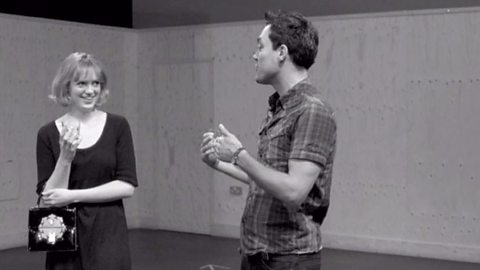
Act 2, Scene 1 - The Lovers. video
Demetrius goes to the woods to find Hermia, with Helena in hot pursuit.
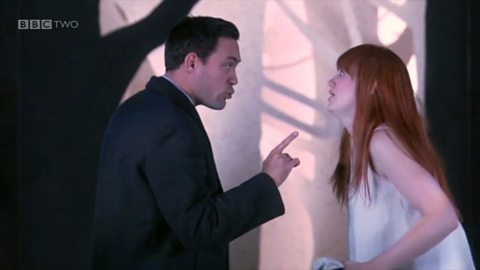
Act 2, Scene 1 - Titania crosses Oberon (workshop) video
A look at the importance of the child at the centre of Titania and Oberon's argument.
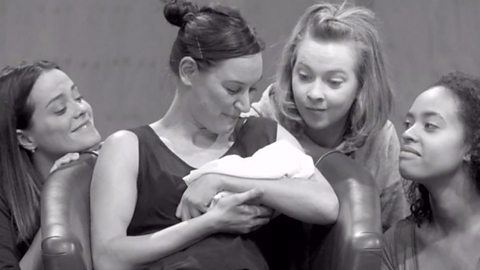
Act 1, Scene 2 - Clowning around (workshop) video
The company explore comic timing, playing for laughs and how to make Bottom funny.
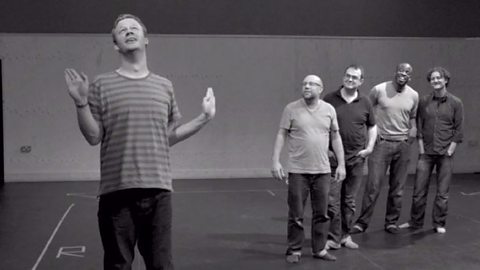
Act 1, Scene 2 - Quince v Bottom (workshop) video
Bottom and Quince battle to be the most important person present and experiment with playing the characters as high and low status.
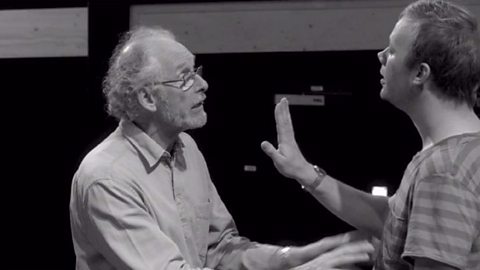
Act 1, Scene 2 - The Mechanicals. video
A group of working men meet to prepare a play for the court.
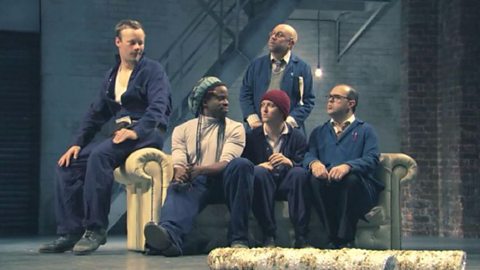
Act 2, Scene 1 - The Fairies. video
The King and Queen of the Fairies meet for the first time.
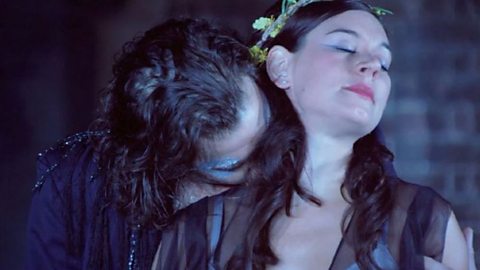
Act 2, Scene 1 - Ecological disaster (workshop) video
A look at how Titania shows Oberon the impact of their argument on the world, discussing Shakespeare's use of language and imagery.

╠²